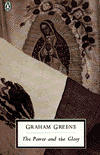| Graham Greene on The
Power and the Glory:
But long before the drunken priest another character had come on board my awful boat in Frontera,where my story was to open – the dentist I called Mr. Tench, who made his living with gold fillings even in that abandoned little port…His character needed no "touching up." |
||
| The novel draws parallels with T.S. Elliot's poem "The Hollow Men". The hollow men wander in a barren landscape, trying to remember the line after "For Thine is the Kingdom" in the Lord's Prayer. The phrase happens to be "the Power and the Glory". | He was as complete in The Lawless Roads as he was in The Power and the Glory, and as I read on I encounter more and more characters whom I have forgotten, who beckon to me from the pages and say ironically, "And did you really believe you had invented me?" | |
Here is the amiable
corrupt Chief of Police in Villahermosa,and in the
village of Yajalon I encountered "a mestizo with
curly sideburns and two yellow fangs at either end of his
mouth. He had an awful hilarity and an inane laugh which
showed the empty gums.  He wore a white
tennis shirt open at the front and he scratched himself
underneath it." After a week of his company I would
find it impossible to abandon him forever, and so he
became the Judas of my story. And the Lehrs – the
kindly Lutheran couple – they didn’t belong to
my imagination, for here they are giving shelter to a
tired traveller in the same fashion as they did to the
whisky priest. Of invented characters how very few seem
to remain apart from the two protagonists, the priest and
the Lieutenant of Police; when I came to write I was
handing out alternative destinies to real people whom I
had encountered on my journey. He wore a white
tennis shirt open at the front and he scratched himself
underneath it." After a week of his company I would
find it impossible to abandon him forever, and so he
became the Judas of my story. And the Lehrs – the
kindly Lutheran couple – they didn’t belong to
my imagination, for here they are giving shelter to a
tired traveller in the same fashion as they did to the
whisky priest. Of invented characters how very few seem
to remain apart from the two protagonists, the priest and
the Lieutenant of Police; when I came to write I was
handing out alternative destinies to real people whom I
had encountered on my journey. |
||
| The Power and the Glory was published in 1940 and won the Hawthornden Prize. The Vatican did not condemn it until 1953, leading Evelyn Waugh to advise Greene that "they have taken fourteen years to write their first letter. You should take fourteen years to answer it." Greene did not directly refuse the Church's demands for revisions but rather replied that the copyright was in his publishers' hands. The matter was dropped. | I think The Power and the Glory is the only novel I have written to a these: in The Heart of the Matter Wilson sat on a balcony in Freetown watching Scobie pass by in the street long before I was aware of Scobie’s problem – his corruption by pity. But I had always, even when I was a schoolboy, listened with impatience to the scandalous stories of tourists concerning the priests they had | |
| encountered in
remote Latin villages (this priest had a mistress,
another was constantly drunk), for I had been adequately
taught in my Protestant history books what Catholics
believed; I could distinguish even then between the man
and his office.Now, many years later, as a Catholic in
Mexico, I read and listened to stories of corruption
which were said to have justified the persecution of the
Church under Calles and under his successor and rival
Cardenas, but I had also observed for myself how courage
and the sense of responsibility had revived with
persecution – I had seen the devotion of peasants
praying in the priestless churches and I had attended
Masses in upper rooms where the sanctus bell could not
sound for fear of the police. I had not found the
idealism or integrity of the lieutenant of The Power
and the Glory among the police and pisteleros
I had actually encountered – I had to invent him as
a counter to the failed priest: the idealistic police
officer who stifled life from the best possible motives:
the drunken priest who continued to pass life on. from Ways of Escape, pp.65-68 © Melody Yiu Images and quoted text on this website may be protected by U.S. and international copyright laws. They are presented here for academic interest and personal entertainment. No distribution, reproduction, re-transmission or other rights are given or implied by their appearance. If you have any copyright concerns, please notify me. |
||
 Now, of course, when I reread The
Lawless Roads, I can easily detect many of the
characters in The Power and the Glory. The old
Scotsman, Dr. Roberto Fitzpatrick, whom I met in
Now, of course, when I reread The
Lawless Roads, I can easily detect many of the
characters in The Power and the Glory. The old
Scotsman, Dr. Roberto Fitzpatrick, whom I met in